At home with Elvis: Elvis with his personal physician 'Dr Nick', centre, and friends
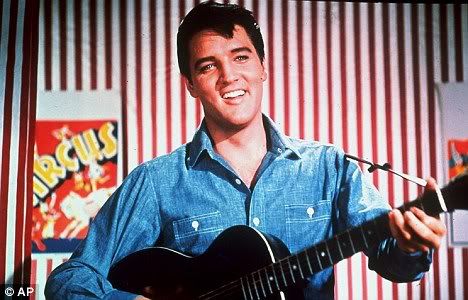 .
.Elvis in the 1964 film Roustabout. Hollywood studio bosses saw to it that he was weighed every day while doctors monitored his diet
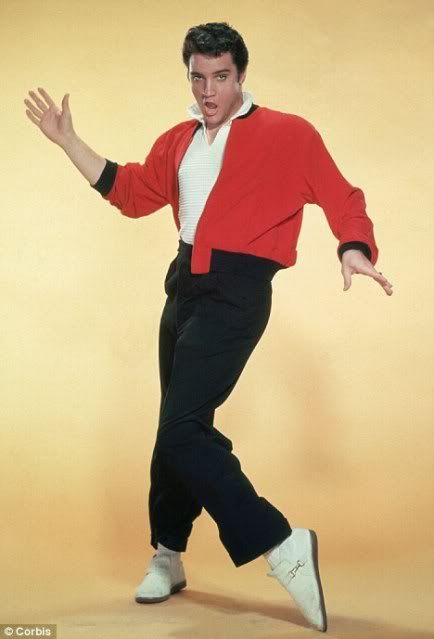
With his broad shoulders forming a perfect V with his trim waist, Elvis was the figure of health in his heyday
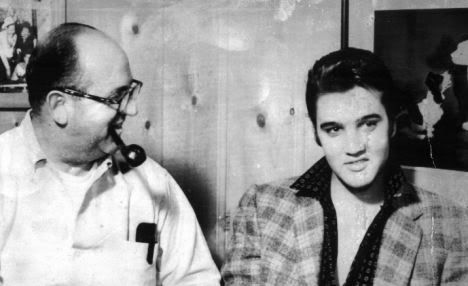
Colonel Tom Parker (left), Elvis's promoter, along with Dr Nick once had to dunk the comatose singer in a bucket of ice so that he could perform on stage
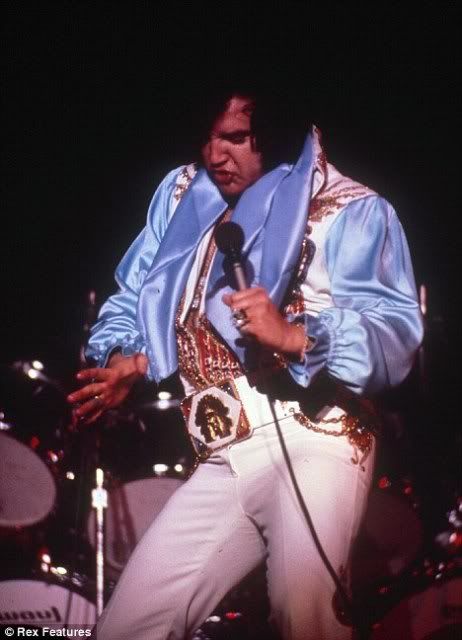
Viva Las Vegas: After a point, Elvis couldn't get through a performance without having to visit the bathroom regularly in between
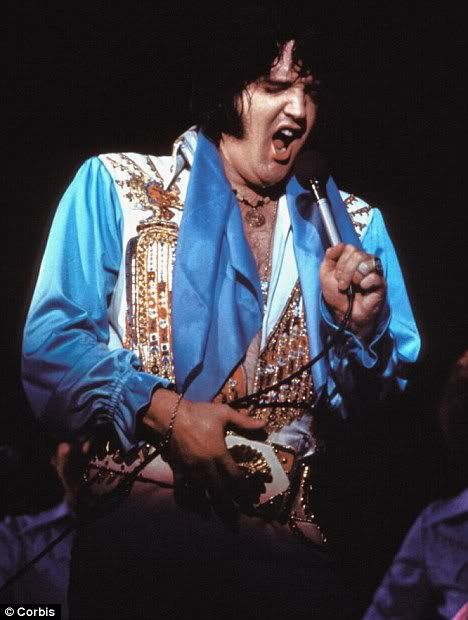
Elvis Presley pictured in 1977, performing in one of his last concerts. Dr Nick had already been called to his side several times by then
Dr Nick!' The voice at the other end of the pager was urgent and panicky. 'You need to get here quick. Something's happened to Elvis.'
The call was a fateful one for Presley's personal physician, George Nichopoulos - known to everyone as Dr Nick.
As with the doctors who attended Michael Jackson in his last days, a finger of suspicion has long been pointed at the man who reputedly wrote 10,000 prescriptions for the 'King' in his final year.
After Elvis died in mysterious circumstances all alone in his bathroom aged just 42, Dr Nick was indicted on 14 counts of over-supplying drugs to him and other patients, including rocker Jerry Lee Lewis.
He became known as The Man Who Killed Elvis and was struck off the Tennessee medical register.
Now, the week after Elvis would have celebrated his 75th birthday, the Mail has had an exclusive preview of the doctor's own fascinatingly candid account of their relationship and the horrendous countdown to his death.
In his tell-all book - not yet published in Britain - Dr Nick reveals there is no truth in any of the many theories that continue to surface about Elvis's lonely end. He wasn't murdered, he did not commit suicide or even overdose. He was simply suffering from such a terrifying surfeit of illnesses that any one might have proved fatal at any time.
It is a bit disillusioning to learn that one of the world's all-time idols, lionised for his raw sexual energy and mesmerising blues voice, had such a bad stomach that he could scarcely get through an evening on stage without having to rush to the bathroom.
Or that his eyesight was so bad from glaucoma - pressure on the eyeball, normally a disease of old age - that he was almost blind. Or that his hair was so prematurely grey that he had to dye it that famous jet-black. Or that his muscles were so sore from all that gyrating that by his 40s, he could hardly move without painkillers.
True, in his last days in Las Vegas, Elvis was no longer the spectacular physical specimen he had been in his youth, but even then, overweight in his shiny white jumpsuits with rhinestone trimmings, he had a remarkable presence.
According to Dr Nick, Elvis suffered from arthritis, gout, a fatty liver, an enlarged heart, migraines, constipation and a colon swollen to twice its normal size (nowadays this would have been resolved by routine surgery).
The singer needed medication for all these ailments - and if he didn't get what he wanted from one doctor, he could always find someone else to prescribe it.
Nichopolous, now 83, met the 'King' one Sunday in 1967 when he was on call at the local Memphis medical centre. He drove out to Elvis's ranch ten miles away to find the 32-year-old star, still a fine-looking man, holding hands with his fiancee, Priscilla, in an acute state of embarrassment.
Shyly, Elvis dropped his underpants to reveal severely reddened buttocks and inner thighs caused by excessive horse-riding.
The son of a Greek immigrant restaurateur, Dr Nick was brought up in a churchgoing family, like Elvis, and they had both served in the Army in Germany. The singer wasted no time in telling him that he needed to take sedatives to help him sleep, followed by amphetamines to wake him up, and that he took codeine shots for pain.
Alarm bells started ringing in 1968 when Elvis, whose wife had just given birth to their daughter Lisa Marie, asked his new friend to treat him for laryngitis and tonsillitis.
Dr Nick duly dropped by Graceland with a bottle of medicine. The next day he returned to find the bottle empty. 'I took it,' declared the patient proudly. 'I need to get well quick, I've got an album to finish.'
And that was the problem in a nutshell. Every time Elvis had work commitments he became so nervous he would get ill. And when he was ill, he wanted an immediate cure.
Dr Nick saw this in July 1969 when Elvis went to Vegas to perform live on stage for the first time for eight years. Soon he was telling the doctor he suffered from 'desert throat' because of the dry climate. The remedy, he said was a 'voice shot', a herbal mixture laced with steroids and liquid cocaine.
Elvis also had routine vitamin B12 and decongestant shots, eyedrops just before he went on stage and when he came off, as well as injections of the painkiller Dilaudid to cure his aching
hips. One of the quickest-acting drugs ever invented, it is five times more powerful than heroin and usually taken by patients in the advanced stages of terminal cancer.
Dr Nick says he was forever trying to nurse his patient back to health. At this point he was not officially Elvis's doctor, but he was always at his beck and call. In 1971 Elvis telephoned from Nashville where he was on tour, complaining of a searing pain in one eye.
Knowing of his susceptibility to crippling migraines caused by stage spotlights and his early glaucoma, the doctor immediately flew to see him, along with a top ophthalmologist. They arrived to find Elvis's condition so serious he needed an immediate injection into the eye to relieve the pressure.
As the doctor tells it, Elvis's eyes were always troubling him, which explains why he wore dark glasses so often. The dye from his hair, eyebrows and eyelashes trickled into his eyes when he sweated, causing conjunctivitis. The scarves he wore were to mop the sweat from his forehead.
These were perennial problems, but in July 1973 there was another real emergency, this time in St Louis. Summoned to Elvis's bedside by his father Vernon, the doctor arrived to find the singer passed out in his hotel room in soiled pyjamas. He was due on stage any moment, but was barely breathing.
The doctor's first thought was that Elvis had had a seizure and he injected him with a stimulant to improve his breathing. Then he and Elvis's manager dragged him into the ensuite bathroom and managed to get him into the bath, which they filled with cold water. Soon they were dressing him in his stage clothes.
Incredibly Elvis managed to perform that night, leaving Dr Nick determined to find out what had caused the handsome man he first met to degenerate into the bloated figure he had become.
Elvis himself refused to give him any clues. Finally, one of his problems was revealed - he and Priscilla were getting divorced. Three days after the final decree was issued in California, the singer, in worse condition than he had ever been, chartered a plane back to Graceland and called for Dr Nick.
This time the doctor arrived to find his patient's face puffy, pink and almost transparent, and his stomach distended. He suspected either an allergic reaction or heart failure, especially since heart disease ran in the family.
Hospital tests established that Elvis had hepatitis, an enlarged liver ( possibly from painkillers) and Cushing's syndrome. The last was a hormonal disease that caused bloating, and was down to the many steroids he had been taking to combat the asthma that ran in the family and his ongoing colon problems.
When Dr Nick asked him why he was also covered in bruises, Elvis tried to tell him the marks were from acupuncture needles. Finally he confessed that a couple of Beverly Hills physicians had prescribed the narcotic Demerol to cure back and neck pain, and Novocaine to reduce the pain at the injection sites.
Elvis, it turned out, was addicted to both drugs and had to be weaned off them with methadone, normally reserved for heroin addicts.
While he was in hospital detoxing, Dr Nick went to Graceland and scoured the place for all the pernicious substances Elvis had managed to collect over the years. He came away with a stash that included 3,000 capsules of Spansule - a powerful amphetamine.
The doctor was beginning to realise that the only thing Elvis refused to take were street drugs, because so many musicians had died from them. So he devised a plan to replace the chemical contents of the singer's capsules with artificial sweetener.
Dr Nick, now Elvis's official physician, started working on his general health. First he suggested a sleep clinic for his insomnia, but Elvis would not go. He told him not to take pills but just to sleep when he wanted. Elvis did not sleep for three days and stuffed himself with food instead.
So Dr Nick came up with a diet to control the colon disease that was causing his dramatic weight fluctuations. But Elvis wouldn't keep to it. He latched on to a sugar-free jelly diet he had read about in a magazine. He ate the stuff ten times a day.
Next Dr Nick tried to persuade him to exercise. The doctor's son Dean, a top-ranking racquetball player, taught him the game, and Elvis had a court built in Graceland so he could play all night if he wanted. But for a man capable of such athletic gyrations on stage, Elvis proved surprisingly uncoordinated. If he got tired he would just sit down and start laughing.
An unpromising patient, he must also have been a bore to be around when he was not performing. Sometimes he would hole up reading his favourite book, The Prophet by Khalil Gibran. But he could be seduced by any new fad - a motorcycle-a customised jet, or even a new recipe for a hamburger.
Then there was his obsession with guns. It started when he feared assassination after Robert Kennedy was killed, but it got to such a point that he habitually shot at the television set if he didn't like the programmes.
He once put his arm round his father (who had just recovered from a heart attack) and pressed the trigger on his pistol at the same time - no one knew whether he had done it on purpose.
If the people around him queried his behaviour, he simply showered money on them. He once gave 13 hangers- on a Cadillac each. He helped Dr Nick with his mortgage, gave his family beautiful gifts and took them all on holidays to Hawaii and Colorado. Whenever he fancied a new girl - he had to have a woman in his bed every night - he seduced her with her own car, a diamond ring and a trip to Vegas.
There, Elvis had a doctor who would put him on a 'sleep diet' stuffing him with sugary liquid nutrient and chemically inducing sleep for three weeks.
Dr Nick says he tried to warn him this was dangerous behaviour for a borderline diabetic with colon disease, but Elvis refused to listen.
He bought himself a medical handbook and started treating himself, persuading other doctors to give him Sparine, a dangerous long-acting anti-psychotic that gave him speech and muscle problems and caused his blood pressure to drop.
Then there was Donnetal, a drug for irritable bowel syndrome and stomach ulcers, which contributed to his speech and movement problems. He went back on the Demerol and was soon hospitalised after an overdose.
Dr Nick says that whenever Elvis demanded a narcotic shot, he tried to give him a placebo instead. But the singer was susceptible to panic attacks that needed the real thing.
Once, when a huge gust of wind hit his private jet and it fell several hundred feet, Elvis was too frightened to use the oxygen masks.
He fell on the floor next to an air vent, sucking in the air and ordering the pilot the land the plane. Elvis had to check into a hotel and have a calming shot before he could continue on his journey.
When he tried to perform that night he was so tired he had to sit down. Soon he had to leave the stage because of his bowel problems.
Punishing tours had worn him out. After each show he would fly out to the next city and the next hotel. He would sleep till about 5pm and then start getting nervous about the next performance.
Dr Nick finally devised a system of envelopes containing the exact dose Elvis needed for his ailments: high blood pressure, diabetes, allergies, kidney and colon problems and arthritis, three to be given in a 12-hour period.
But even with two fulltime nurses, he could not stop him buying over-the-counter medications and receiving little unmarked brown paper packets of mysterious substances through the post.
In the last few months Elvis was sleepwalking and depressed, but he refused to see a psychiatrist because he thought it was a sign of weakness. Now even his voice was letting him down and he did not know where he was with his new girlfriend Ginger Alden.
He had known her only two months when he took the 11-andahalf-carat diamond out of his own ring and set it in one for her. In January 1977, he proposed because she reminded him of his long- dead mother. But he would still often end up left alone at night, reading his books.
Then, on August 16, Dr Nick received the fateful call. As he sped to his patient's side he thought of all the things that could have gone wrong. He knew Elvis had seen a dentist late that night and played some racquetball in the early hours.
Had he over- exerted himself? Was he dehydrated because of his faddy diet of sugar-free drinks, jelly and lollipops? Had any of his welter of medications interacted with each other?
So what did kill the King? Although blood tests showed traces of 14 different drugs in his body, the doctor says that none were at toxic levels. The official cause of death was 'fatal heart arrhythmia' - a heart attack.
But Dr Nick believes Elvis went to the bathroom that night with his usual problems, and suffered a drop in blood pressure followed by a seizure. By the time he was discovered it was too late.
The King was dead.
Get Elvis Presley stuffs






![Viva Las Vegas [Soundtrack]](http://ws.amazon.com/widgets/q?MarketPlace=US&ServiceVersion=20070822&ID=AsinImage&WS=1&Format=_SL160_&ASIN=B002YGKYPO&tag=mywoea-20)






RELATED POSTS:-
- Boston prepares for days of mourning for Kennedy
- Tribute to Kennedy , The Kennedy Camelots
- Obama family goes for Ice cream ,watch Avatar in cinema,play golf,visit the beach as daughters learn to surf.Obama enjoy holiday.
- Tiger Woods scandal cost shareholders up to $12 billion
- Advertisement start to withdrawal from sex scandal hit Tiger woods as Tiger quit golf indefinity
- Tiger Woods Mother in Law is now in hospital rumoured anxiety attack after row over Tiger affairs.
- Tiger woods have affair with porn star. The 7th Tiger woods mistress.Celebrity sex scandal continues for Tiger woods.Holly Sampson soft porn.
- Celebrity Scandal Tiger woods mistress.Jamiee Grubbs,Kalika Moquin,Rachel Uchitel.Read the recorded messages
- Celebrity Tiger Woods admits adultery and publicly apologize and ask for privacy.Sex affairs with 3 ladies.
- Celebrity Tiger Woods hit by allegation affairs with 2 mistress cocktail waitress and club promoter.
- Michael Jackson BiZzare world..Who's who in Michael Jackson world.
- Pop star Michael Jackson dead at 50
- Queen and Royal Family arrive at Sandringham for traditional Christmas Day service in the snow
- Child Care visit Tiger Woods family.Gilliette Cut off TigerWoods ads.Elin preparing to divorce.Tiger Love group sex.Leave from golf.
- Chelsea Clinton engaged to marry boyfriend
- Tiger woods and wife still no cooperating to talk to police.
- A shoplifting mother... now England soccer captain's father is caught on film selling cocaine
- Jackson to be interred Aug. 29 at Forest Lawn in Glendale
- LaToya says Michael was really ‘murdered’ - Secret agreement ? between debbie&katherine jackson
- Jackson adviser Tohme breaks silence






0 comments:
Post a Comment